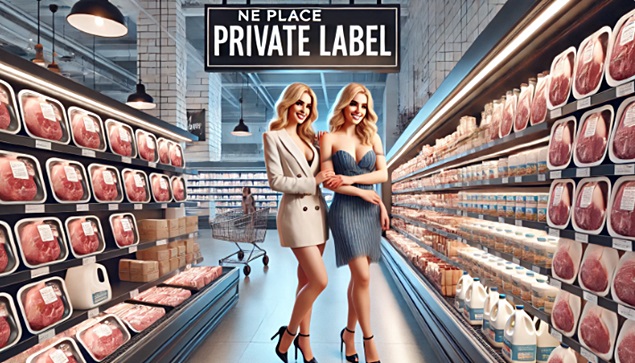2407

Private Labels See Significant Growth in Europe, Capturing Nearly 40% Market Share
Private labels have experienced substantial expansion in Europe, reaching a market share of nearly 40% in the Fast-Moving Consumer Goods (FMCG) sector, according to a Circana report from May 2023. This trend reflects notable shifts in both European consumer behavior and retailer strategies.
Private Label Growth in Europe
In Europe’s six major markets – France, Italy, Germany, Spain, the United Kingdom, and the Netherlands – private labels have surpassed national brands in popularity across nearly all product categories.
Spain registered the highest private label penetration, with 47% of FMCG sales, followed by Germany with 41% and the United Kingdom with 37%. These figures highlight the diversity and adaptability of private labels in varying market contexts.
Key Drivers Behind the Growth
The cost-of-living crisis has been a central factor in the rise of private labels. Consumers, in search of more affordable options without compromising quality, have increasingly turned to these products.
Studies show that 60% of consumers believe private labels are as innovative and high-quality as national brands, and 66% perceive them as innovative.
These perceptions have helped private labels gain consumer trust and loyalty, now matching the loyalty levels of branded products.
Diversification and Innovation in Private Labels
Retailers have invested in diversifying and innovating their private label portfolios, offering products that cater to a wide range of consumer preferences and needs.
For example, in perishable food categories, private labels have attracted shoppers with their competitive pricing and perceived quality.
In segments such as alcoholic beverages and children’s products, national brands have retained a stronger presence. In response, retailers have launched innovative offerings, including non-alcoholic beers and premium artisanal products, to appeal to these consumer groups.
Consumer Perception and Loyalty
Research reveals that 21% of consumers consider private labels to be superior to branded products in terms of innovation, quality, and other attributes.
Moreover, 93% of consumers have maintained or increased their sustainable shopping habits in the past year, indicating a growing preference for value-driven and satisfying products.
These data suggest that private labels have earned consumer confidence by delivering on expectations for quality, affordability, and responsibility.
Challenges and Opportunities for National Brands
While private labels are gaining ground, national brands still maintain a presence. To stay competitive, they must focus on innovation, aligning with new consumer preferences such as sustainability and health-conscious products.
Pricing and marketing strategies must also be revised to compete with private labels, which often offer a strong price-to-quality ratio.
An additional factor reshaping the private label landscape is the growing consumer interest in sustainability. Research shows that 77% of shoppers consider sustainability an important purchasing criterion, and that sustainable products often command price premiums over their conventional counterparts.
This trend presents opportunities for retailers to develop private label products that meet environmental expectations, combining affordability with eco-friendly values.
The Expansion of Private Labels
The rise of private labels in Europe reflects major changes in both consumer behavior and retail strategy.
These products have captured nearly 40% of the FMCG market, offering attractive alternatives to national brands through competitive pricing, product diversity, and positive quality perception.
To remain relevant, branded manufacturers must align with evolving consumer expectations—particularly in areas such as sustainability and innovation—while adapting their pricing and promotional tactics.
In a rapidly evolving market, both private labels and national brands must continue to innovate and adapt to meet the ever-changing needs of European consumers. (Photo: AI Generator)





